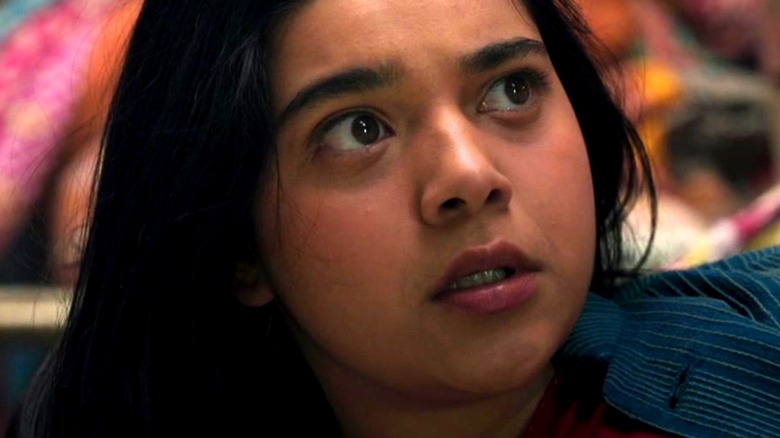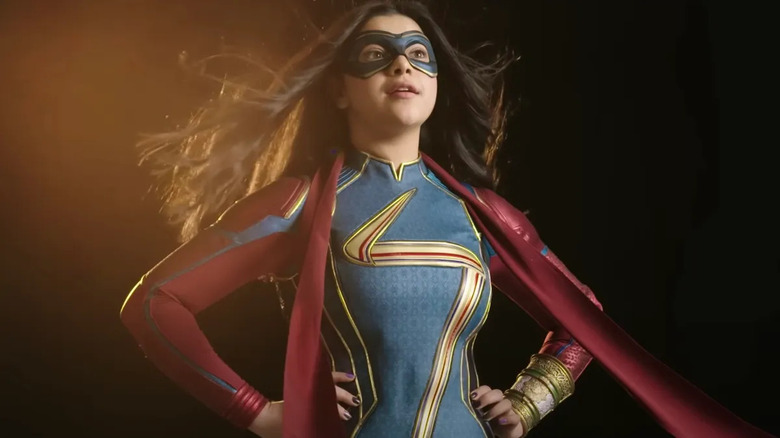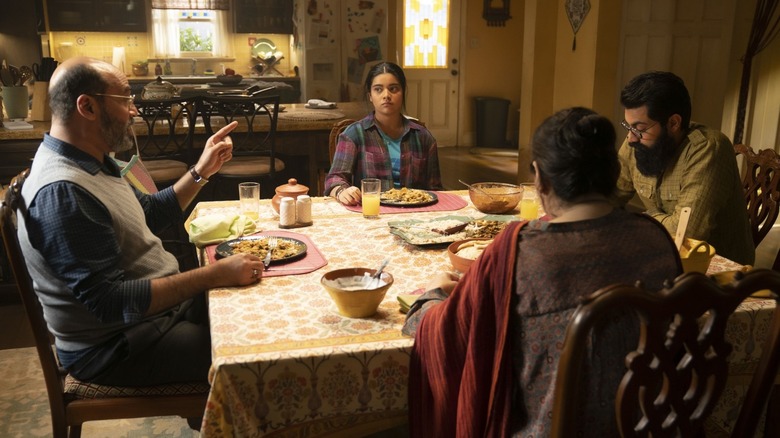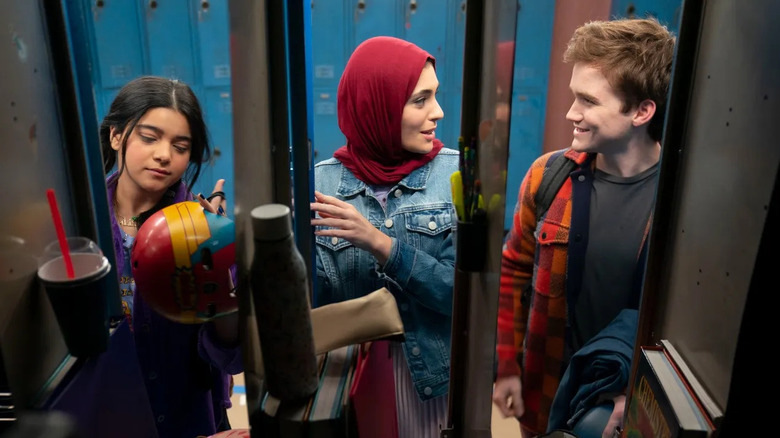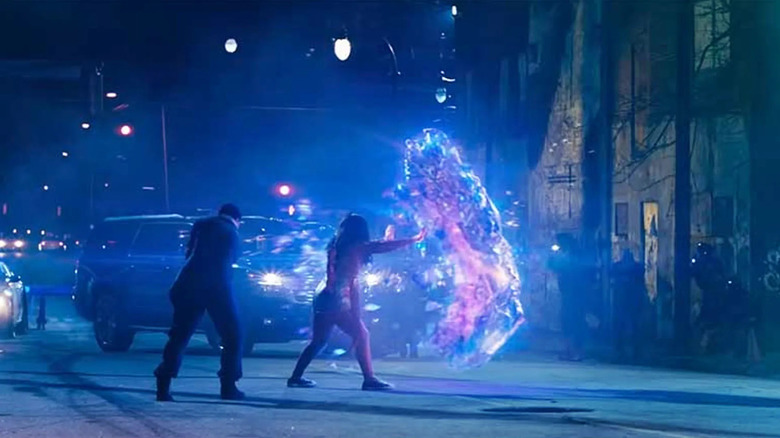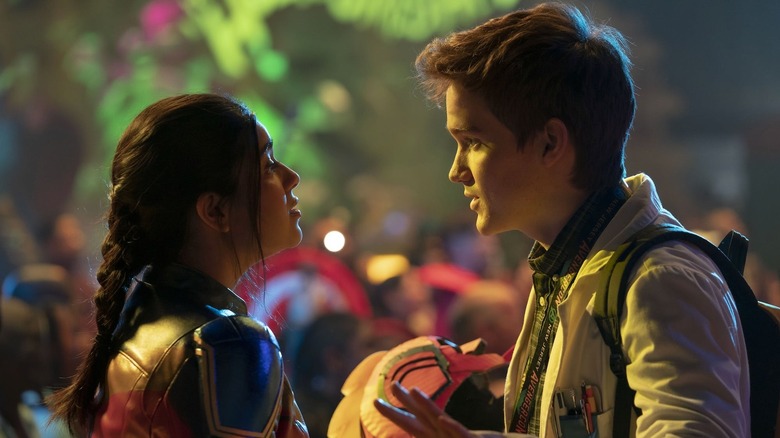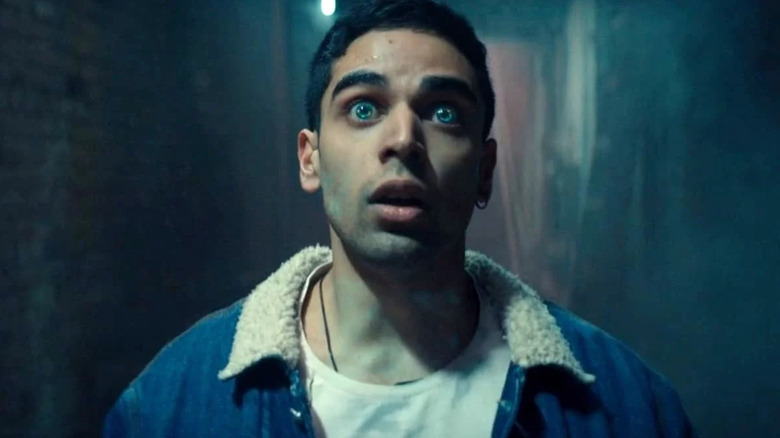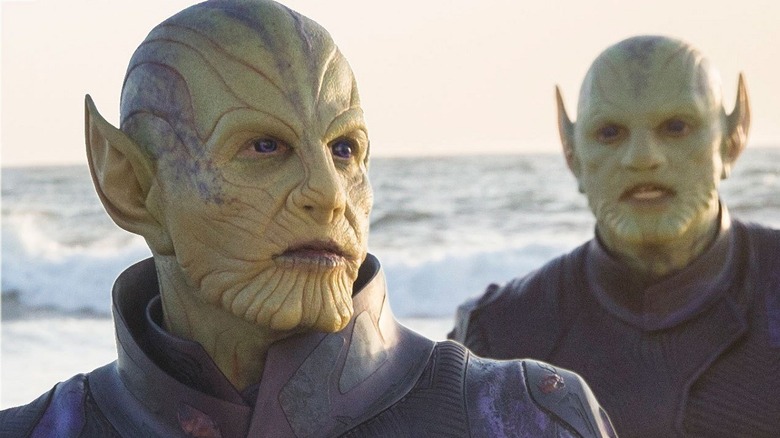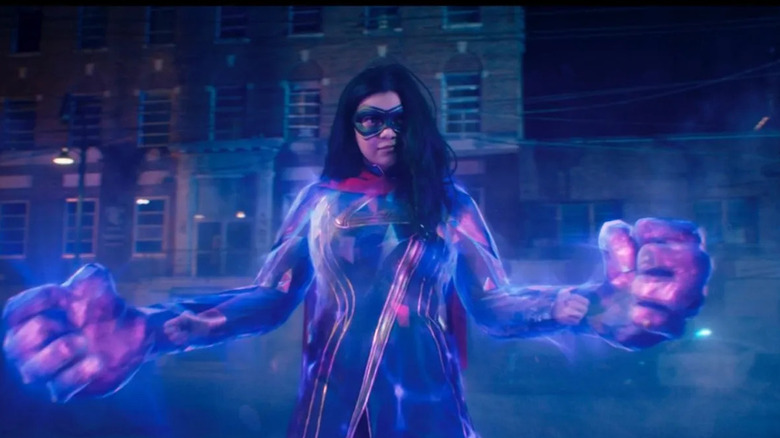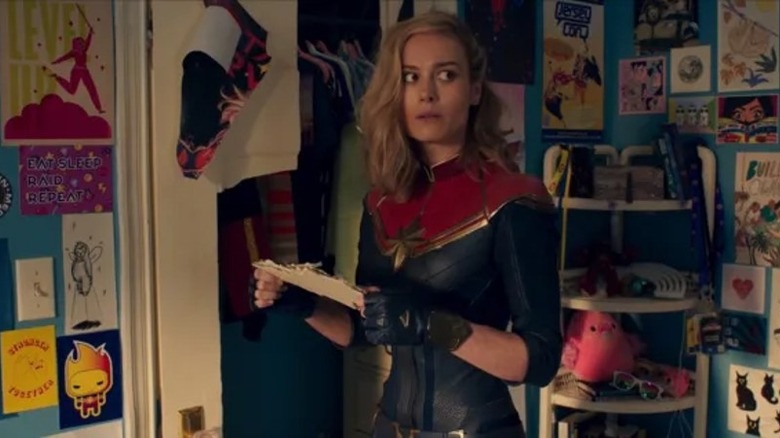The Ending Of Ms. Marvel Explained
"Ms. Marvel" is all about mixing traditions with new ways of doing things. In Kamala Khan's case, that means going to her family's mosque and attending AvengerCon. In the case of the Disney+ series itself, it means that audiences encounter typical MCU elements (hidden dimensions, cosmic energy battles) as well as some components that aren't so common (Pakistani and Muslim culture, a teenage love triangle). It's also incredibly meta, as its young protagonist is as much of a fan of Marvel comics as the show's viewers are. The finale episode pays off much of Kamala's pressing personal business and makes good on some fan service, but it left its larger-scale plot arcs bending toward other projects.
In the end, "Ms. Marvel" proved to be more of an origin story than anything else. Though there were allusions to broader MCU concepts like incursions, Kamala Khan is primarily concerned with things like friends, boys, and her YouTube channel. As the events of the series unfold, she becomes engulfed in the mystery surrounding her lost great-grandmother, Aisha. The truth that Kamala uncovers in Pakistan heals some of the divisions within her own sense of self and within her family. She emerges stronger as a teenage girl and as a superhero who is ready to take on whatever's next. This is where "Ms. Marvel" leaves Kamala, her friends, and her family. Here is what the ending of "Ms. Marvel" means for the future of the MCU and for the new fan-favorite character.
Kamala's costume comes together
Over the course of five episodes, "Ms. Marvel" has been putting together Kamala Khan's comic accurate costume in slow motion. It begins with a Carol Danvers cosplay (with the help of Bruno, who gives Kamala her mask), and it continues with the gold bangle from the box of her grandmother's things. Along the way, she picks up a blue vest from Waleed, courtesy of the Red Daggers, plus a long red scarf from Kareem. The final piece of the puzzle is the broken necklace that spells out her name in Arabic but now looks like a lightning bolt. It once gave her mother, Muneeba, the inspiration she needed to whip out her sewing machine once she got back to New Jersey.
Kamala's mother presents her with a box that contains her very own superhero uniform. The garment that is inside combines all of the influences that make Ms. Marvel into Ms. Marvel. It's reminiscent of her hero Captain Marvel's getup. It includes references to all the friends — old and new — who helped her once she became supercharged. It embraces her heritage as well as her personal style — plus it looks great with her red Converse sneakers.
This scene calls back to the one from the premiere episode in which her mother makes her and her father matching Hulk costumes which she is too embarrassed to wear, and not only because it establishes that Muneeba is a talented seamstress. By the finale, Kamala's view of herself (and her mother) has matured as she admires herself in the mirror, not as a fangirl but as a superhero in her own right.
She's her family's Marvel
The final episode begins with a humorous bit in which Kamala decides to come clean to her family about her newfound powers and her secret identity. It turns out — because her family is close-knit and because speakerphone is convenient — they all already knew. This scene is another mirror of a sequence from Episode 1 in which Kamala stands before her family and tries to convince them to let her go to AvengerCon. There, she mistakes her parents' strict rules for lack of support and feels the need to lie and sneak out. She feels inferior to her pious, soon-to-be-wed brother, especially since her mother doesn't seem to approve of her interest in comics and fandom.
In this episode, the Khan family makes it clear they're amazed, proud, and completely supportive. Of course, it takes a trip to Pakistan to convince Muneeba that both her mother and her daughter are telling the truth. During that excursion, Kamala is told that her name is unusual. When she and her father, Yusuf, have a heart-to-heart on the roof, he explains why they chose it. He and Muneeba had trouble conceiving a second baby. After they'd almost given up hope, she was born, and she was perfect. She was their miracle baby — their "marvel."
Kamala's jaw drops at the realization that she shares a name with Carol Danvers' alter ego. This revelation allows her to shed the dreaded moniker Nightlight and it gives her real superhero name added meaning.
Her friends and family become her team
Episode 5 touchingly — though somewhat hastily — wrapped up the plotlines about Kamala's family history, the Djinn, and the Veil in an installment that time traveled back to the partition. In contrast, the finale episode spends its time tying up loose ends in Kamala's present, where she's dealing with friend and boy drama, all while the Department of Damage Control is still after her and Kamran. Ms. Marvel may have saved lives as a fledgling superhero in earlier episodes, but in this chapter, her community has her back, which fits with the show's themes.
Since she no longer has to hide her identity from her loved ones, they become her team members. Though Nakia expresses anger at her friend for bringing undue negative attention to their place of worship before, the whole mosque stands up to the Department of Damage Control in her defense. Kamala, Bruno, Nakia, Aamir, and eventually Zoe all meet up at the school, where they stage their resistance.
Zoe is a supposed former friend of Kamala and Nakia's who has risen above their popularity station thanks to the social media following she has amassed. However, she's genuinely grateful to Kamala for saving her life at AvengerCon and lets the group know that the DODC tried to turn her. In an unexpected twist on a YA trope, Zoe uses her influencer status for good and rallies the public around Kamala.
Damage Control needs damage control
Episode 6 opens with a disclaimer that warns, "There are certain scenes in this fictional series that some viewers may find upsetting." What, exactly, this warning refers to is up to interpretation as "No Normal" boldly takes on subject matter that recalls anti-Muslim sentiment post September 11, the overuse of force against non-white people by police, and school shootings. In world, the Department of Damage Control seems to know its reputation is on the line, as Sadie Deever's superior gives her orders to stand down. She ignores them, and a fight that doesn't cleanly pit good against evil ensues.
Throughout the series, Nakia worries about how law enforcement interacts with the Muslim population in Jersey City, and she tells Kamala that they've invaded the mosque twice. The show has admirably wrestled with the Muslim American experience in the wake of terrorist attacks, especially since it's set so close to New York City, but the tension shifts into a higher gear once DODC sets up its perimeter around a school. Kamran and Kamala are both characters of color, and Kamala is in the uncomfortable position of having to defend Kamran against DODC at the same time that she has to keep him from harming the officers or any innocent bystanders.
Watching the DODC patrol school hallways with firearms pointed at kids wearing hoodies is difficult. Though Kamran can't control his powers yet and is vacillating between superhero and supervillain, Kamala's judicious and masterful use of her own powers attracts the attention of onlookers. The crowd's viral cell phone videos compel DODC to fire Deever and allow Kamala to go free.
Her love life is still messy
"Ms. Marvel" is compelling as an action-packed comic book story and as a historical family drama, but it's at its best as a teen rom-com that's as good if not better than anything else on YA bookshelves or streaming services today. Sharp-eyed audiences may have noticed a clip from the turn-of-the-millennium show "Felicity" — which was famous for its love triangle — on a TV in the background as a subtle piece of foreshadowing. Kamala, like Felicity, is an awesome chick with unnecessarily low self-esteem who suddenly finds herself with her choice of the men in her life.
In Kamala's life, there's Bruno, her man-in-the-chair and wannabe love interest. His unrequited affection for her is painfully clear from the moment she leaves the proton gloves he made for her in the bathroom. Next, there's Kamran, who conspicuously appears around the time Kamala realizes she's (as the DODC would say) an enhanced individual. She and Kamran share Djinn ancestry and Noor magic. She also swoons at his tall, dark, and handsome appearance, much to Bruno's dismay. Finally, there's Kareem, the dashing masked do-gooder from her homeland who's more independent and adult than slightly-beta Bruno and evil mama's boy Kamran.
Every "Ms. Marvel" fan has their favorite. However, rather than choose a suitor for herself, Kamala calls on two of them to assist the other. Bruno helps a struggling Kamran, then witnesses an almost kiss between him and Kamala. Kareem, a member of the Red Daggers, offers to protect his sworn enemy, a ClanDestine. At the episode's conclusion, one of her beaus is headed to California as the other two presumably go into hiding, meaning this love story has a ways to go before its happy ending.
We're not done with the Djinn, the Veil, or the Red Daggers just yet
If there's an area where "Ms. Marvel" fell a little short, it was in its handling of the series' mystical influences, only because there wasn't enough time in its six episode run. Kamala learns that her great grandmother was a Djinn when the ClanDestines track her down in hopes of using her bangle to get back home. They fool her (though not necessarily the audience) into thinking that they're her allies, but she eventually discovers that Najma killed Aisha and that returning the ClanDestines to their realm would likely cause an incursion that could destroy Kamala's universe.
In Episode 5, the Veil opens. Before Najma passes through it, Kamala reminds her of the son she abandoned. She whispers his name and appears to transfer powers to him — powers that almost exactly resemble those of Kamala's. Then, Najma and the other ClanDestines in the immediate vicinity turn to blackish crystal that disintegrates, revealing their skeletons. It certainly seems like they're dead, and the Veil seems like it's closed.
With that threat fairly easily overcome, Kamala returns to New Jersey, where she later reveals to a nervous Kamran that his mother did, in fact, perish in Karachi. She tells him that his mother did what she did to save him, but in her final moment, Najma didn't exactly give off an altruistic vibe. We still don't really know much about the MCU's version of the Red Daggers (who've been expanded from a single character into an organization), the ClanDestines, the Veil, or even Noor magic. Chances are, this part of "Ms. Marvel" has only just begun.
The lack of villains is curious
The lack of a true villain in "Ms. Marvel" is interesting in and of itself. Najma and the ClanDestines turn out to be slightly sympathetic but ultimately small potatoes adversaries that didn't even factor into the finale episode (though we'll probably revisit the Djinn situation), and the Department of Damage Control is mostly an inconvenience. No previously established foes show up either, all of which suggests Kamala Khan's main antagonist — and thus her main purpose — is still in her future.
We know from "Captain Marvel" and from a "WandaVision" mid-credits scene that the Kree and the Skrulls will continue to play a role in this franchise going forward. The flashback in "Ms. Marvel" illustrated how Aisha came by the bangle, which was attached to a blue arm that had become unattached from its body. This appendage could belong to a Kree, a race of blue aliens who have a disturbing connection to the Inhumans, which is significant because, in the comics, Kamala is an Inhuman, though she isn't here (via The Ringer). Just as curiously, there was also imagery from "Shang Chi and the Legend of the Ten Rings" on the temple floor, suggesting a connection to that film.
Some fans theorized that a character (Sadie Deever was a frequent guess) could turn out to be a secret Skrull, the shapeshifting enemies of the Kree who are currently allied with Nick Fury. This didn't explicitly happen, but it's still possible that any number of characters in "Ms. Marvel" or any other MCU properties could be a Skrull in disguise. A war between the Kree and the Skrull from the comics also involves the X-Men, who (fans hope) are soon to join the MCU.
Her powers get a new label
Easily the most watercooler-worthy moment of "Ms. Marvel" comes after a title card that reads "one week later." Bruno, now in possession of Kamran's car and jacket, is about to leave for CalTech. He approaches Kamala, needing to get something off of his chest. The audience thinks he's about to confess his true feelings, but the information he shares with her is infinitely more consequential to the MCU than his crush.
Bruno says that Aamir kept asking if he might have powers, too. To check, Bruno compared Kamala's DNA to the rest of her family. Something was different. Before, he and Kamala suspected that all the Khans could be capable of wielding Noor power if they had an object or weapon like the bangle. However, that doesn't seem to be the case. Aamir and most of the rest of Kamala's family aren't super, and that's because her particular ability to harness Noor energy comes from a mutation.
That's right — Kamala is a mutant. For anyone who thinks the use of that extremely loaded word is a coincidence, the inclusion of an "X-Men" sound cue underneath the scene should be enough evidence. In the comics, Kamala Khan is an Inhuman, but fans should've been prepared for her origin story to deviate since the manner by which she acquires her powers in the MCU is already a change from the source material. Though some fans will surely be disappointed, the reassignment from Inhuman to mutant is, let's be honest, a promotion. Earth-838's variant of Professor X's cameo in "Doctor Strange in the Multiverse of Madness" cracked the door for mutants to enter the MCU, but this exchange in "Ms. Marvel" kicks it wide open.
Kamala and Carol swap places
Marvel fans love to theorize about what legacy comic characters might get screen time in the Disney+ shows. Sometimes those guesses are on the money (He Who Remains and Kingpin both get practically a whole episode devoted to them), while other times they're so wrong it becomes a running joke (as is the case for Mephisto). The safest of bets was that Carol Danvers — aka Captain Marvel — was going to make at least a cameo in the series about her biggest admirer.
Sure enough, Carol arrives on Earth in a post-credits stinger, where she materializes literally out of nowhere in full superhero regalia. One minute, Kamala is in her room, not doing science homework when her bangle begins to glow. The next, she's sucked through her closet door and into a portal. A split second later, she's replaced by Carol, who takes out a chunk of drywall trying to stick her interdimensional landing and mutters, "Oh no, no, no," as she deduces she's magically appeared in the bedroom of an obsessive superfan. It's safe to assume that Kamala and Carol have switched places and not bodies, since we see Carol trying to make sense of her unfamiliar surroundings. We'll likely see this scene from Kamala's perspective, wherever she is, sooner rather than later.
A final title card reads, "Ms. Marvel will return in 'The Marvels.'" That film, which is directed by Nia DaCosta and stars Brie Larson as Captain Marvel, Iman Vellani as Ms. Marvel, and Teyonah Parris as Monica Rambeau, premieres on July 28, 2023.
